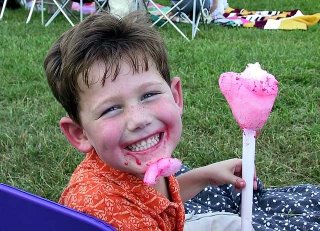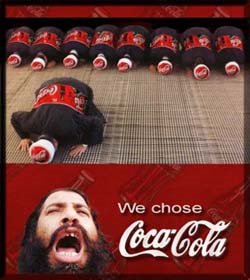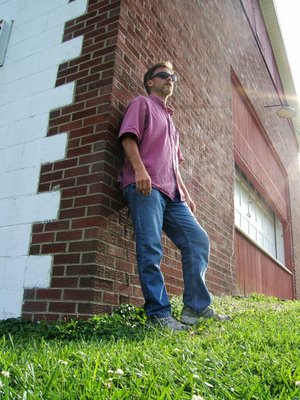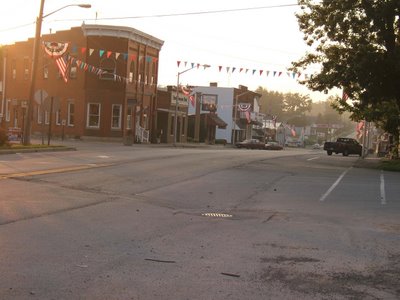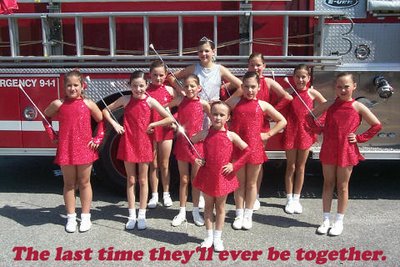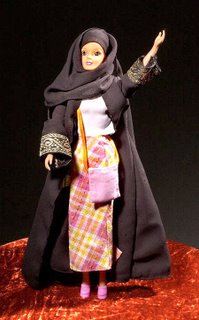 That I have stopped walking for two hours every day does not mean I have stopped exercising. Because to stop exercising would be to begin dying. Yes, I know I’m dying whether I exercise or not, but a soft body is its own little subdivision of lifelessness.
That I have stopped walking for two hours every day does not mean I have stopped exercising. Because to stop exercising would be to begin dying. Yes, I know I’m dying whether I exercise or not, but a soft body is its own little subdivision of lifelessness.The longest I’ve ever stagnated is two months. And that’s since December of 1974.
It was on Christmas Eve of that year that I tried to lift one of the large presents under the tree with my name on it—you know, so I could shake it a little. Well, not only could I not shake it, I couldn’t budge it. I couldn’t raise even a corner of it off the floor. It was then that I said to myself, Holy smokes, Dad has gone and got me a weight set.
How could he have done something like that? What was he thinking? I went into my room to figure out how to let the old man down gently. Maybe I would open the present, look surprised, say, “This is really neat!” and then quickly ask for some eggnog, or grab a handful of tinsel and throw it around the room and yell, “Look how light and shiny this stuff is!” Or maybe I would ask how many Christmas cards we had gotten. I would ask if we broke last year’s record. Then I would say to my mother, “I bet it’s hard getting Christmas cards out every year. I don’t know how you do it. Do you ever get writer’s cramp? You’re amazing, Mother.” Then, after all this, I would let my eyes wander back under the tree and find a present for someone else. “Oh, look, Father," I would say. "Here’s a present for you. And look! I can lift it! It bet it’s not a @%!$# weight set!”
Honestly. What made my dad think that a fifteen year-old would want to lift heavy things for the sake of his health? I’d be better served, I thought, with a television for my room.
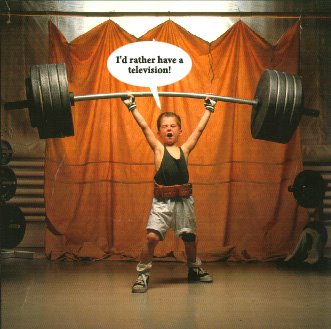 The more I thought about it, the more troubled I became. How could anyone lay such a burden on another person, let alone a loved one? Let alone an innocent youth? It was like giving someone a puppy. “We just thought we’d get you a little something to love and feed and worry about for the next fifteen years. We hope you like it. Please pass the fruitcake.” It was like giving someone a Mount Everest expedition. “It was such a great deal, we couldn’t pass it up. You’ll be flying to Katmandu on January 6th to acclimate, and the climbing party sets out in late April. Hey, open the one with the blue bow next—it’s your ice pick.”
The more I thought about it, the more troubled I became. How could anyone lay such a burden on another person, let alone a loved one? Let alone an innocent youth? It was like giving someone a puppy. “We just thought we’d get you a little something to love and feed and worry about for the next fifteen years. We hope you like it. Please pass the fruitcake.” It was like giving someone a Mount Everest expedition. “It was such a great deal, we couldn’t pass it up. You’ll be flying to Katmandu on January 6th to acclimate, and the climbing party sets out in late April. Hey, open the one with the blue bow next—it’s your ice pick.”I drove my head into my hands and paced my bedroom. My family would begin opening presents in an hour. I had to be certain of the justness of my cause; I had to believe wholly in it, for only then could I convincingly defend it.
My cause was sloth.
 I paced and groaned and considered. I thought of my dad’s feelings, but most importantly, I thought of my feelings. But then I thought of my arms. I thought of my dad’s feelings again, in order to forget about the feeling I'd just had about my arms. Then I thought of Christmas cookies. Then I accidentally thought of my stomach muscles; then I accidentally thought of girls. I thought of my shoulders then—by accident. I tried to think again about my feelings, and succeeded. But then I thought of Mt. Everest—don't ask my why; I really didn't mean to think of Paula Mareno, but in she came, right after Mt. Everest. I thought of my dad’s feelings again, in the nick of time. But then I thought of my calves; hmm; what calves? I thought of resistance and the audacity of fighting it; that was a much better thought, and helpful. But then I thought of Laura Anne Williams, who sat next to me in Algebra—not helpful. I thought of my dad’s feelings again, but this was interrupted by the thought—the accidental thought—of removing my shirt in front of Laura Anne Williams; then—God help me—I thought of removing Laura Anne Williams’ shirt—I assure you that this was a complete and utter accident. For a diversionary tactic, I tightened my abs; nothing happened. I looked in the mirror and tried to find my stomach muscles. Lord Jesus and Santa Claus—where are my stomach muscles? In a panic, I looked into my eyes; I stared at myself. This was a big mistake because, as I stared at myself, I heard a strange voice, and the voice spoke clearly to me—inside my head—and the voice said: I think you want to do this.
I paced and groaned and considered. I thought of my dad’s feelings, but most importantly, I thought of my feelings. But then I thought of my arms. I thought of my dad’s feelings again, in order to forget about the feeling I'd just had about my arms. Then I thought of Christmas cookies. Then I accidentally thought of my stomach muscles; then I accidentally thought of girls. I thought of my shoulders then—by accident. I tried to think again about my feelings, and succeeded. But then I thought of Mt. Everest—don't ask my why; I really didn't mean to think of Paula Mareno, but in she came, right after Mt. Everest. I thought of my dad’s feelings again, in the nick of time. But then I thought of my calves; hmm; what calves? I thought of resistance and the audacity of fighting it; that was a much better thought, and helpful. But then I thought of Laura Anne Williams, who sat next to me in Algebra—not helpful. I thought of my dad’s feelings again, but this was interrupted by the thought—the accidental thought—of removing my shirt in front of Laura Anne Williams; then—God help me—I thought of removing Laura Anne Williams’ shirt—I assure you that this was a complete and utter accident. For a diversionary tactic, I tightened my abs; nothing happened. I looked in the mirror and tried to find my stomach muscles. Lord Jesus and Santa Claus—where are my stomach muscles? In a panic, I looked into my eyes; I stared at myself. This was a big mistake because, as I stared at myself, I heard a strange voice, and the voice spoke clearly to me—inside my head—and the voice said: I think you want to do this.The hair on the back of my neck stood up, and I left it there. I walked from my room into a strange new world. Some would call it a darkened hallway leading to the place where the Christmas tree was, but I knew it as a new world. I understood then that climbers leaving Everest base camp felt more alive than other people. With every step toward that heavy box, I ascended a good slope. It was a slope of the simplest beginning. I knew then, for certain, that a man could change his own life.
I lifted those weights three days a week, religiously, for an entire year. I did not miss a single workout—not one. I found an inner strength and a personal resolve I never knew I had. It began on Christmas Eve, 1974, and sustains me to the present hour. I have applied it to all other aspects of my life. It is the second most amazing gift I have ever received, and it is all due to my dad.
My dad died two years ago, but he lives in me now, through everything I accomplish.
I am who I am because of him.















